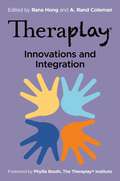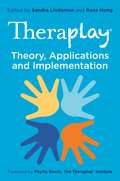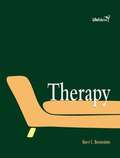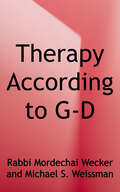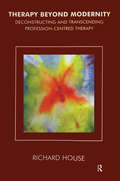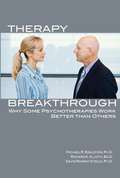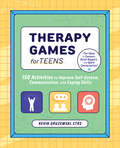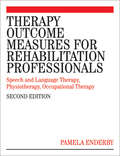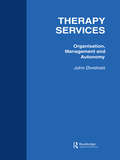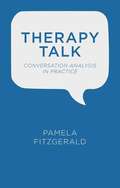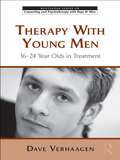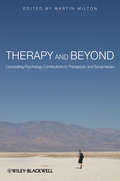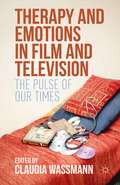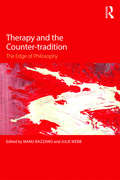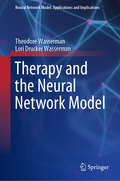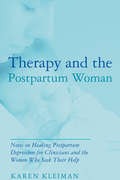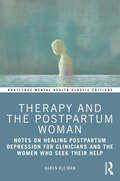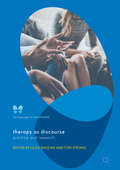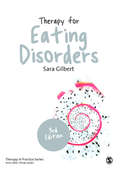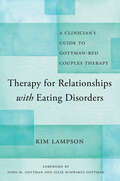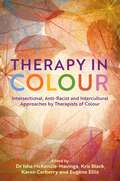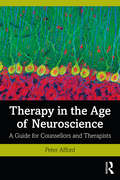- Table View
- List View
Theraplay® – Innovations and Integration (Theraplay® Books & Resources)
by Rana Hong and A. Rand ColemanOfficially endorsed by The Theraplay® Institute, this handbook builds on the core concepts of Theraplay® and explores innovative ways to integrate the approach with other therapeutic models for diverse settings and client groups. The book features chapters on the neurobiology of Theraplay®, Tele-Theraplay, and men in Theraplay®, as well as advice for working with traumatized children, neurodivergent children, intergenerational trauma, and homelessness. Throughout the handbook, you'll be encouraged to challenge the limits of your practice and discover new ways to approach challenges using techniques rooted in extensive research-based evidence. Contributions from a wide variety of specialists create a rich tapestry of expertise, providing practical recommendations for integrating Theraplay® with other modalities to give clients the best support for their unique needs.Essential reading for Theraplay® trainees, play therapy practitioners, and professionals working with children, this guide explains the practical applications of cutting-edge research and provides a flexible, effective approach to your practice.
Theraplay® – Theory, Applications and Implementation
by Edited by Sandra Lindaman and Rana HongOfficially supported and endorsed by the Theraplay Institute, this handbook provides concrete assistance from international experts on deepening Theraplay knowledge and skills in much-needed and requested areas of practice.With up-to-date information on Theraplay theory, applications and implementation, the chapters cover Theraplay with infants, toddlers, school aged children and adolescents. Home, school, and out-patient mental health settings are all covered in detail, as well as dyadic and group forms of Theraplay. Client issues include interpersonal violence, LGBTQ families, anxiety, child sexual abuse, transitioning from foster care to adoption, and deaf and hard of hearing. Additionally, extensive information is provided about working with caregivers including discussion of their own attachment history, practice sessions before including the child, and regular caregiver-only sessions to process and strengthen Theraplay treatment.This book is essential for any Theraplay practitioner wanting to ensure their approach is fully informed and carefully tailored to meet their client's needs.
Therapy
by Gerri C. BorensteinMost people go to the doctor to fix a broken bone, or a dentist to fix their teeth. But where can you go for mental health problems? Sometimes, the answer is therapy. When feelings of worry and stress begin to take over your life, a therapist can help. Therapy will guide you through every step of the process, including how to know when you need help and what to expect on your first visit. You'll also find out what questions to ask and how to get the most out of therapy.
Therapy According to G-d: A Rabbi and a Psychologist Discuss Life
by Rabbi Mordechai Wecker Michael S. WeissmanThe Torah is the Blueprint for the Universe. It is the owner's manual to life. Our mission is to learn G-d's Torah and strive to be closer to Him. Still, the Torah is even more than that. It is G-d making Himself known to the world. It has been our lifeblood for over three thousand years. It's what sustains us, keeps us alive, and gives us our sense of purpose in the world. It is eternal. It is also high drama. It is the story of relationships, conflict, and (sometimes) resolution. The Torah shares its stories to help us understand who we are and where we come from - and how we must live and grow and evolve, constantly improving ourselves, refining our character traits, and developing healthier and better relationships. Thousands of years ago and today, people have dealt with difficult issues such as anxiety, loneliness, depression, anger issues, family conflict and substance abuse. In this book, we attempt to show how eternal Torah principles can be incorporated into our daily lives - and how we can find healing and connection.
Therapy Beyond Modernity: Deconstructing and Transcending Profession-Centred Therapy
by Richard HouseThis book draws together radical critiques of therapy and shows how therapists have become too willing administrators of the mind, and how they then delight in the bureaucratic management of therapeutic practice.
Therapy Breakthrough
by David Ramsay Steele Ed.D. Richard K. Kujoth Michael R. EdelsteinMore people are in psychotherapy than ever before. Yet most of them have no idea of the vast differences between the hundreds of various schools of therapy. Therapy Breakthrough is the first book to clearly explain the theories and practices of the two big camps: Psychodynamic or PD therapy and Cognitive-Behavioral or CB therapy. PD therapists believe that emotional problems are caused by hidden forces in our unconscious minds, forces that cannot be observed directly and that resist being uncovered. CB therapists, by contrast, maintain that the roots of people's emotional and behavioral disturbances can be identified by direct questions, and these problems can then be tackled by straightforward techniques. Therapy Breakthrough is written from the standpoint of CB therapy. Using psychological research, philosophy, and common sense, it argues that PD therapy is founded on mistaken theories of the mind, and explains how to apply CB methods directly to your own problems.
Therapy Games for Teens: 150 Activities to Improve Self-Esteem, Communication, and Coping Skills
by Kevin GruzewskiBuild teen self-esteem and communication skills with 150 simple, effective therapy games Planning thoughtful and productive therapy activities for teens doesn't have to be a complex challenge or require a lot of specialized resources. Therapy Games for Teens makes it easier to reach them, with 150 games based in recreation therapy that help teens cope with stress, bullying, grief, anxiety, depression, and more. These fun and inclusive therapy games are designed specifically with teens in mind. Step-by-step instructions show you how to guide them as they practice everything from labeling their own emotions to creative ways of venting frustration, with techniques that incorporate mindfulness and self-reflection. Give teens the tools to navigate life's challenges effectively, so they can grow up into confident, self-aware adults. Therapy Games for Teens helps: Put teens in control—Designed for both groups and individuals, these therapy games use self-exploration and creative expression to help teens let their guard down and learn valuable coping skills. Discussion questions—Each activity includes tips, talking points, and open-ended questions to help teens put what they learned into perspective and apply it to their lives. Practical and doable—The therapy games use simple materials like pencils, paper, dry-erase boards, and tape so there's no need for expensive or specialized tools. Help teens arm themselves with skills to manage their emotions and step into their potential.
Therapy Online: A Practical Guide
by Kate Anthony Deeanna Merz Nagel"An enjoyable book that helps to bring counselling into the 21st century. Kate and DeeAnna have played a significant role in the development of online therapy and their enthusiasm for the subject matter, and experience as trainers and practitioners, comes through in this informative text." Terry Hanley, Director of MA in Counselling, University of Manchester The plethora of online services now available has led to a growing demand for practitioners to look beyond traditional face-to-face therapy and take advantage of the flexibility which email and the Internet can offer them and their clients. This guide gives up-to-the minute information and research, ethical and legal advice, on the practicalities of setting up or joining a service, and the essential therapeutic skills needed to be an effective online therapist. Writing for an international audience, the authors discuss the issues for practitioners using the Internet today, as well as in the future. Basing their study on published empirical research, they address: - text-based therapeutic interventions such as email, Internet Relay Chat and forums, from the perspective of different theoretical orientations, illustrated with a full length case study - new Ethical Framework for using Technology in Mental Health - online supervision, online research; group therapy online - the "business" of setting up in private practice or e-clinics - other therapeutic uses of technology including use of video therapy, mobile SMS, telephone therapy, Virtual Reality environments, gaming and computerised CBT. The authoritative guide to all aspects of being an online therapist, this practical text is a vital addition to any therapist's library. It will also be valuable reading for anyone training to be a counsellor or psychotherapist in our increasingly 'electronic' world.
Therapy Outcome Measures for Rehabilitation Professionals
by Alexandra John Brian Petheram Pamela EnderbyPreviously published as two separate books for Speech and Language Therapists and for Physiotherapists, Occupational Therapists and Rehabilitation Nursing, this book has now been updated and expanded and combines the two first editions into one. This fits in with the increased amount of team working in rehabilitation, both in hospital and community settings. The book assists with the practical implementation of gathering outcome data on patient/clients receiving treatment. Over the last decade there has been a growing awareness of the importance of being able to gather information that could assist in identifying specific gains related to treatment programmes. This should not only help to identify areas for resource change, but also enable health care professionals to monitor the effectiveness of their treatments with individual clients.
Therapy Services: Organistion
by OutreveltIn the past the therapy professions concentrated on developing their practice base while social scientists examined the relationships between the practioners and the field of medicine. Neither fully recognized the importance of organisation and management in making the most of scarce and valuable resources. This book calls for a more positive response to the new 'public welfare markets' which are emerging in the UK and elsewhere. Effective organisation and management are essential if the therapy professionals are to secure their futures and ensure effective service delivery.
Therapy Talk: Conversation Analysis in Practice
by Pamela E. FitzgeraldTherapy Talk aims to help those who apply 'the talking cure' become better at their jobs by enabling them to understand how their verbal responses may channel the conversation partner into a particular direction, promoting conversation analysis as a useful tool to study and enhance the therapeutic alliance between client and practitioner.
Therapy Tech: The Digital Transformation of Mental Healthcare
by Emma Bedor HilandA pointed look at the state of tech-based mental healthcare and what we must do to change it Proponents of technology trumpet it as the solution to the massive increase in the mental distress that confronts our nation. They herald the arrival of algorithms, intelligent chatbots, smartphone applications, telemental healthcare services, and more—but are these technological fixes really as good as they seem? In Therapy Tech, Emma Bedor Hiland presents the first comprehensive study of how technology has transformed mental healthcare, showing that this revolution can&’t deliver what it promises.Far from providing a solution, technological mental healthcare perpetuates preexisting disparities while relying on the same failed focus on personal responsibility that has let us down before. Through vivid, in-depth case studies, Therapy Tech reveals these problems, covering issues including psychosurveillance on websites like Facebook and 7 Cups of Tea, shortcomings of popular AI &“doctors on demand&” like Woebot, Wysa, and Joy, and even how therapists are being conscripted into the gig economy.Featuring a vital coda that brings Therapy Tech up to date for the COVID era, this book is the first to give readers a large-scale analysis of mental health technologies and the cultural changes they have enabled. Both a sobering dissection of the current state of mental health and a necessary warning of where things are headed, Therapy Tech makes an important assertion about how to help those in need of mental health services today.
Therapy With Young Men: 16-24 Year Olds in Treatment (The Routledge Series on Counseling and Psychotherapy with Boys and Men)
by Dave VerhaagenYoung adult men in their late teens and early twenties are statistically the least happy of any group of males surveyed. What’s more, scholarly research tells us that adolescent boys and young men have the highest rates of behavioral problems, completed suicides, and drug and alcohol problems of any demographic group. They also tend to have greater problems managing their emotions and successfully negotiating close interpersonal relationships, which makes therapy more complex and challenging. However, when done well, therapy with young men can be highly effective and quite rewarding for both the therapist and client. In Therapy With Young Men, Verhaagen presents a comprehensive model of therapy with young men that addresses each of these concerns, beginning with the rapport and engagement process, and then moving to ways to increase motivation for changing problem behaviors and increasing adaptive skills. The book describes a wide range of novel, effective cognitive-behavioral interventions that can readily be employed in the therapeutic process.
Therapy and Beyond
by Martin MiltonTherapy and Beyond: Counselling Psychology Contributions to Therapeutic and Social Issues presents an overview of the origins, current practices, and potential future of the discipline of counselling psychology. Presents an up-to-date review of the knowledge base behind the discipline of counselling psychology that addresses the notion of human wellbeing and critiques the concept of 'psychopathology'Includes an assessment of the contributions that counselling psychology makes to understanding people as individuals, in their working lives, and in wider social domainsOffers an overview of counselling psychology's contributions beyond the consulting room, including practices in the domain of spirituality, the arts and creative media, and the environmental movementCritiques contemporary challenges facing research as well as the role that research methods have in responding to questions about humanity and individual experience
Therapy and Emotions in Film and Television: The Pulse of Our Times
by Claudia WassmannTherapy and Emotions in Film and Television explores, from an interdisciplinary perspective, the shifts in our emotional preferences, styles, and 'emotional regimes' in western societies from the 1920s to today, as viewed through the lens of film and television.
Therapy and the Counter-tradition: The Edge of Philosophy
by Manu Bazzano Julie WebbTherapy & the Counter-tradition: The Edge of Philosophy brings together leading exponents of contemporary psychotherapy, philosophers and writers, to explore how philosophical ideas may inform therapy work. Each author discusses a particular philosopher who has influenced their life and therapeutic practice, while questioning how counselling and psychotherapy can address human ‘wholeness’, despite the ascendancy of rationality, regulation and diagnosis. It also seeks to acknowledge the distinct lack of philosophical input and education in counselling and psychotherapy training. The chapters are rooted in the Counter-Tradition, whose diverse manifestations include humanism, skepticism, fideism, as well as the opening of philosophy and psychology to poetry and the arts. This collection of thought-provoking essays will help open the discussion within the psychological therapies, by providing therapists with critical philosophical references, which will help broaden their knowledge and the scope of their practice. Therapy & the Counter-tradition: The Edge of Philosophy will be of interest to mental health professionals, practitioners, counselling and psychotherapy trainees and trainers, and academics tutoring or studying psychology. It will also appeal to those interested in psychology, meditation, personal development and philosophy.
Therapy and the Neural Network Model (Neural Network Model: Applications and Implications)
by Lori Drucker Wasserman Theodore WassermanThis innovative work explores integrating emerging research into how the brain processes information in applied therapeutic interventions. Typically, clinicians select therapeutic interventions based on their own training, personal experience or preference. This book aims to provide a new model, based upon the neural networks, to both understand the development of mental health issues and their persistence, and how and why to apply therapeutic interventions to impact the systems which are maintaining them.This work begins with a short and accessible overview of the neural network model, and the general aims of therapy. It elucidates components of the neural network model of learning such as reward recognition, automaticity, and memory reconsolidation, and how they apply to both general learning and new learning through the process in therapy. Next, the authors explore how the neural network model can be integrated across existing systems of therapy, including Cognitive Behavior therapy (CBT), Dialectical Behavior Therapy (DBT), third wave therapies and analytic therapies. Therapy and the Neural Network Model is an exciting resource for researchers and practitioners interested in understanding more about the applications of a neural network model for therapy and the how and why of building new mentally healthy cognitions, behaviors and emotions. Therapy and the Neural Network Model is also an essential theoretical foundation for both researchers and practitioners who wish to base their therapeutic practice on neuroscience and integrate their work with related fields such as behavioral medicine, health psychology, social work and public health.
Therapy and the Postpartum Woman: Notes on Healing Postpartum Depression for Clinicians and the Women Who Seek their Help
by Karen KleimanThis book provides a comprehensive look at effective therapy for postpartum depression. Using a blend of professional objectivity, evidence-based research, and personal, straight-forward suggestions gathered from years of experience, this book brings the reader into the private world of therapy with the postpartum woman. Based on Psychodynamic and Cognitive-Behavioral theories, and on D.W. Winnicott's "good-enough mother" and the "holding environment" in particular, the book is written by a therapist who has specialized in the treatment of postpartum depression for over 20 years. Therapy and the Postpartum Woman will serve as a companion tool for clinicians and the women they treat.
Therapy and the Postpartum Woman: Notes on Healing Postpartum Depression for Clinicians and the Women Who Seek their Help (Routledge Mental Health Classic Editions)
by Karen KleimanWritten by a pioneer and continuing advocate for perinatal health, this book remains remains an enduring reference for any therapist working with pregnant or postpartum women and their families suffering from perinatal mood and anxiety disorders.This Classic Edition includes a new preface by Hilary Waller that reflects on changes in the field since the book’s first publication. Using a blend of professional objectivity, evidence-based research, and personal, straight-forward suggestions gathered from years of experience, this book brings the reader into the private world of therapy with the postpartum woman. Based on psychodynamic and cognitive-behavioral theories, and on D.W. Winnicott's ‘good-enough mother’ and the ‘holding environment’, the book is written by a therapist who has specialized in the treatment of postpartum depression for over 30 years. Chapters address diagnosis, medication, depression, psychosis, suicidal thoughts, bonding, as well as finding meaning and the power to heal during recovery. Bringing further attention to under recognized illnesses which plague mothers and cloud the childbirth experience, this Classic Edition serves as an accessible companion tool for clinicians and the women they treat.
Therapy as Discourse: Practice and Research (The Language of Mental Health)
by Tom Strong Olga SmoliakThis book addresses the premise that therapy can be understood, practiced, and researched as a discursive activity. Using varied forms of discourse analysis, it examines the cultural, institutional, and face-to-face communications that shape, and occur within, therapies that are discursively understood and practiced. By first providing an overview of commonalities across discursive therapies and research approaches, the authors discursively examine general aspects of therapy. Topics explored include subjectivity, psychological terms, institutional influences, therapeutic relationships, therapists’ ways of talking and questioning, discursive ethics, and assessment of therapeutic processes and outcomes. This book offers a macro-analysis of the conversational practices of a discursively informed approach to therapy; as well as a micro-analysis of the ways in which language shapes and is used in a discursively informed approach to therapy. This book will interest practitioners seeking to better understand therapy as a discursive process, and discourse analysts wanting to understand therapy as discursive therapists might practice it.
Therapy for Eating Disorders: Theory, Research & Practice (Therapy in Practice)
by Ms Sara Gilbert'This updated edition provides an excellent overview of the diagnosis, prevalence and causes of eating disorders, as well as a handbook for the application of evidence based interventions. A "must buy" for eating disorder services and individual practitioners!' Sally Savage, Clinical Lead for Northamptonshire NHS Eating Disorders Lifespan Service Affecting thousands of people every year with potentially devastating consequences, anorexia, bulimia and binge eating disorders are becoming increasingly evident in today's fast paced, high pressured society. Drawing on over 20 years' experience as a practitioner, Sara Gilbert takes the reader through the complexities of working with eating disorders, drawing on practical, cognitive behavioural and educational approaches to theory, assessment, treatment and practice. Packed full of new resources for both qualified professionals and trainees, this new edition includes: · A summary of new research on the causes of eating disorders, dual diagnosis and co-morbidity. · New content on the best treatment for eating disorders and preparing clients for treatment. · An updated chapter examining the effects of nutrition on physical and psychological well-being. · New content on working with complexity and risk. · A fully updated reference section. This is a vital resource for practitioners in the mental health field, including psychotherapists, psychologists, counsellors, psychiatrists, mental health nurses and dieticians. Sara Gilbert is a chartered clinical psychologist whose specialist interest in the field of eating disorders spans 20 years. She has worked for 12 years as a clinical lead in an eating disorder service in the NHS and is now in private practice.
Therapy for Relationships with Eating Disorders: A Clinician's Guide to Gottman-RED Couples Therapy
by Kim LampsonA groundbreaking new resource for treating eating disorders. Effective eating disorder treatment modalities for adults continue to elude practitioners, and the rates of eating disorder relapse remain staggeringly high. Meanwhile, a vital resource for people with eating disorders remains unexplored: their romantic relationships. Tapping into this largely ignored vein of support, Gottman-RED (Relationships with Eating Disorders) is a new therapy for couples in which one or both partners have an eating disorder. Built upon a foundation of traditional Gottman Method Couples Therapy interventions, Gottman-RED adds fourteen new interventions designed specifically to help couples address difficult issues related to food, weight, body image, and exercise. These interventions encourage conversations characterized by empathetic engagement in which both partners are heard. This highly versatile therapy is the culmination of Dr. Kim Lampson’s thirty years of working as a counseling psychologist with both couples and individuals with eating disorders. It offers a crucial, missing piece in the puzzling world of eating disorder treatment modalities.
Therapy in Colour: Intersectional, Anti-Racist and Intercultural Approaches by Therapists of Colour
by VariousIf you are seeking to create a more intersectional, anti-racist, and inter-cultural approach to therapy, this edited collection emerging from the Black, African and Asian Therapy Network is an invaluable resource for your practice.This collection covers topics such as the psychological trauma of racism, the various barriers to accessing support for mental health and the lived experience of Black, African, or Asian people in a profession that is still dominated by Eurocentric perspectives, training, and practice. Each contribution further reinforces the importance and benefit of having an intersectional, anti-racist, and inter-cultural approach to your therapeutic practice and contains insight from 27 experts in the psychological arena.This book is split into four sections - the first focusses on colour, creativity, and anti-racist reflections. Part two covers training in the psychological field in the past, present, and future. Part three discusses CPD, supervision and self-care with a specific focus on mental, spiritual, physical, and emotional health and lastly, part five centralises therapeutic needs and psychological wellbeing within the context of identity, culture, and belonging.
Therapy in the Age of Neuroscience: A Guide for Counsellors and Therapists
by Peter AffordTherapy in the Age of Neuroscience: A Guide for Counsellors and Therapists is an essential guide to key areas of neuroscience that inform the theory underlying psychotherapy, and how they can be applied to practice. Laying out the science clearly and accessibly, it outlines what therapists need to know about the human nervous system in order to be able to engage with the subject. Chapters cover the neuroscience underlying key aspects of therapy such as relationships, emotion, anxiety, trauma and dissociation, the mind-body connection, and the processes which enable therapists to engage deeper aspects of mind and psyche. This book responds to the need for counsellors and therapists to have an accessible and comprehensive guide to how contemporary neuroscience views mind and body. Therapy in the Age of Neuroscience will appeal to psychotherapists, counsellors and other mental health professionals who wish to learn more about how to integrate neuroscience into their work.
Therapy in the Age of Neuroscience: A Guide for Counsellors and Therapists
by Peter AffordTherapy in the Age of Neuroscience: A Guide for Counsellors and Therapists is an essential guide to key areas of neuroscience that inform the theory underlying psychotherapy, and how they can be applied to practice. Laying out the science clearly and accessibly, it outlines what therapists need to know about the human nervous system in order to be able to engage with the subject. Chapters cover the neuroscience underlying key aspects of therapy such as relationships, emotion, anxiety, trauma and dissociation, the mind-body connection, and the processes which enable therapists to engage deeper aspects of mind and psyche. This book responds to the need for counsellors and therapists to have an accessible and comprehensive guide to how contemporary neuroscience views mind and body.Therapy in the Age of Neuroscience will appeal to psychotherapists, counsellors and other mental health professionals who wish to learn more about how to integrate neuroscience into their work.
